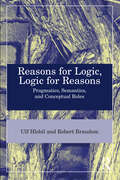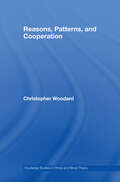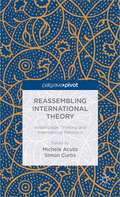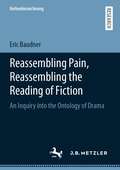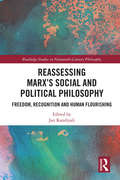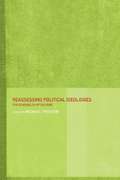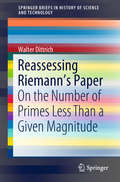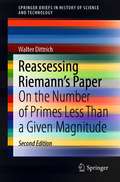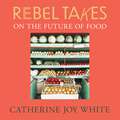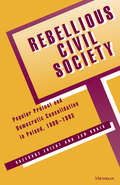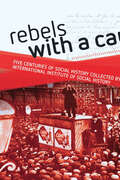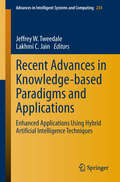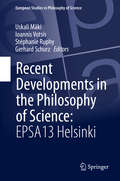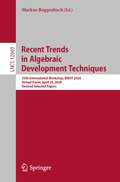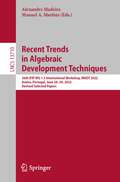- Table View
- List View
Reasons for Logic, Logic for Reasons: Pragmatics, Semantics, and Conceptual Roles
by Robert B. Brandom Ulf HlobilReasons for Logic, Logic for Reasons presents a philosophical conception of logic—“logical expressivism”—according to which the role of logic is to make explicit reason relations, which are often neither monotonic nor transitive. This conception of logic reveals new and enlightening perspectives on inferential roles, sequent calculi, representation, truthmakers, and many extant logical theories.The book shows how we can understand different metavocabularies as making explicit the same reason relations, namely normative-pragmatic, alethic-representational, logical, and “implication-space” metavocabularies. This includes a philosophical account of the pragmatic role of reason relations, treatments of nonmonotonic and nontransitive consequence relations in sequent calculi, a correspondence between these sequent calculi and variants of truthmaker theory, and the introduction of a novel kind of formal semantics that interprets sentences by assigning inferential roles to them. The book thus offers logical expressivists and semantic inferentialists new ways to understand logic, content, inferential roles, representation, and reason relations.This book will appeal to researchers and graduate students who are interested in the philosophy of logic, in reasons and reasoning, in theories of meaning and content, or in nonmonotonic and nontransitive logics.
Reasons for Welfare: The Political Theory of the Welfare State (Studies in Moral, Political, and Legal Philosophy #4)
by Robert E. GoodinRobert Goodin passionately and cogently defends the welfare state from current attacks by the New Right. But he contends that the welfare state finds false friends in those on the Old Left who would justify it as a hesitant first step toward some larger, ideally just form of society. Reasons for Welfare, in contrast, offers a defense of the minimal welfare state substantially independent of any such broader commitments, and at the same time better able to withstand challenges from the New Right's moralistic political economy. This defense of the existence of the welfare state is discussed, flanked by criticism of Old Left and New Right arguments that is both acute and devastating. In the author's view, the welfare state is best justified as a device for protecting needy--and hence vulnerable--members of society against the risk of exploitation by those possessing discretionary control over resources that they require. Its task is to protect the interests of those not in a position to protect themselves. Communitarian or egalitarian ideals may lead us to move beyond the welfare state as thus conceived and justified. Moving beyond it, however, does not invalidate the arguments for constantly maintaining at least the minimal protections necessary for vulnerable members of society.
Reasons of One's Own
by Marc SlorsPractical reasoning in contemporary Western societies is characterised by an unprecedented degree of idiosyncrasy and demands of personal authenticity. This has resulted from the decline of traditional moral authorities, the rise of individualistic lifestyles, increasing multiculturalism and rapid technological advance. These developments have given rise to reflection on the notion of 'reasons of one's own', an examination of the intelligibility of reasons that are closely connected to a particular agent, and recognised as such by others, although not shared by them. Problems addressed by the contributors include; How to account for the cognitive overtones in moral and motivational language given the apparent 'agent-relativity' of reasons. How to retain the 'agent-relativity' of reasons for action given that they require articulation through a language shared by the community, and how to account for the practical rationality required for co-operation between persons in view of the idiosyncrasy of a person's motivating reasons. In dealing with these issues this book presents a range of investigative essays on the concept of reasons of one's own by leading authors from all relevant philosophical areas of expertise.
Reasons without Rationalism
by Kieran SetiyaModern philosophy has been vexed by the question "Why should I be moral?" and by doubts about the rational authority of moral virtue. In Reasons without Rationalism, Kieran Setiya shows that these doubts rest on a mistake. The "should" of practical reason cannot be understood apart from the virtues of character, including such moral virtues as justice and benevolence, and the considerations to which the virtues make one sensitive thereby count as reasons to act. Proposing a new framework for debates about practical reason, Setiya argues that the only alternative to this "virtue theory" is a form of ethical rationalism in which reasons derive from the nature of intentional action. Despite its recent popularity, however, ethical rationalism is false. It wrongly assumes that we act "under the guise of the good," or it relies on dubious views about intention and motivation. It follows from the failure of rationalism that the virtue theory is true: we cannot be fully good without the perfection of practical reason, or have that perfection without being good. Addressing such topics as the psychology of virtue and the explanation of action, Reasons without Rationalism is essential reading for philosophers interested in ethics, rationality, or the philosophy of mind.
Reasons, Patterns, and Cooperation (Routledge Studies in Ethics and Moral Theory)
by Christopher WoodardThis book is about fundamental questions in normative ethics. It begins with the idea that we often respond to ethical theories according to how principled or pragmatic they are. It clarifies this contrast and then uses it to shed light on old debates in ethics, such as debates about the rival merits of consequentialist and deontological views. Using the idea that principled views seem most appealing in dilemmas of acquiescence, it goes on to develop a novel theory of pattern-based reasons. These are reasons to play one’s part in some larger pattern of action because of the goodness or rightness of that pattern. Existing accounts of pattern-based reasons usually assume that such reasons can exist only in cooperative contexts. This book rejects that assumption, and claims instead that we can have pattern-based reasons even when the other agents involved in the pattern are wholly unwilling to cooperate. The result is a pluralist teleological structure for ethics, with similarities to some forms of Rule Consequentialism. Woodard claims that this structure achieves an attractive balance between the two virtues of being pragmatic and being principled.
Reasons, Rights, and Values
by Robert AudiA central concern in recent ethical thinking is reasons for action and their relation to obligations, rights, and values. This collection of recent essays by Robert Audi presents an account of what reasons for action are, how they are related to obligation and rights, and how they figure in virtuous conduct. In addition, Audi reflects in his opening essay on his theory of reasons for action, his common-sense intuitionism, and his widely debated principles for balancing religion and politics. Reasons are shown to be basic elements in motivation, grounded in experience, and crucial for justifying actions and for understanding rights. Audi's clear and engaging essays make these advanced debates accessible to students as well as scholars, and this volume will be a valuable resource for readers interested in ethical theory, political theory, applied ethics, or philosophy of action.
Reassembling International Theory: Assemblage Thinking and International Relations
by Simon Curtis Michele AcutoWhat can 'assemblage' thinking contribute to the study of international relations theory? This study seeks to investigate how the various debates on assemblages in social theory can contribute to generating critical considerations on the connections and dissociation of political agency, physical world and international dynamics.
Reassembling Pain, Reassembling the Reading of Fiction: An Inquiry into the Ontology of Drama
by Eric BaudnerThe present book deals with Sarah Kane’s dramatic text Cleansed to show a specific negotiation of violence, pain, life and death – one that is not necessarily causal or dichotomous. Instead, a new mode of reading, based on Bruno Latour’s take on Actor-Network-Theory, helps to make fictional worlds simultaneously intelligible in a mediate and in an immediate way. This results in an unprecedented understanding of how language can influence and modify ontological configurations. Eventually, this allows for a re-evaluation of political problems that occur in the 20th and 21st century.
Reassessing Marx’s Social and Political Philosophy: Freedom, Recognition, and Human Flourishing (Routledge Studies in Nineteenth-Century Philosophy)
by Jan KandiyaliInterest in the study of Marx’s thought has shown a revival in recent years, with a number of newly established academic societies, conferences, and journals dedicated to discussing his thought. This book brings together distinguished and up-and-coming scholars to provide a major re-evaluation of historical issues in Marx scholarship and to connect Marx’s ideas with fresh debates in contemporary Anglo-American social and political philosophy. Among the topics discussed are Marx’s relationship to his philosophical predecessors—including Hegel, the young Hegelians, and the utopian socialists—his concept of recognition, his critique of liberalism, and his views on the good life. This book will be of interest to scholars and advanced students interested in Marx, Hegel, the history of political thought, and social and political philosophy.
Reassessing Political Ideologies: The Durability of Dissent
by Michael FreedenThis book is a high-level examination of each of the major ideologies that have shaped political thinking, action and conflict. Each chapter provides a critical overview of the current state of the major ideologies and a retrospective assessment of the strengths, weaknesses, developments and transformations of these ideologies over the past century.The volume poses a strong challenge to those who have loudly proclaimed the "end of ideology", by demonstrating that it is impossible to understand current political developments without an appreciation of their ideological context. It features internationally respected contributors who are authorities in their fields, and will be an invaluable resource for both students and specialists in areas including Politics and International Relations.
Reassessing Riemann's Paper: On The Number Of Primes Less Than A Given Magnitude (Springerbriefs In History Of Science And Technology Ser.)
by Walter DittrichIn this book, the author pays tribute to Bernhard Riemann (1826–1866), mathematician with revolutionary ideas, whose work on the theory of integration, the Fourier transform, the hypergeometric differential equation, etc. contributed immensely to mathematical physics. This book concentrates in particular on Riemann’s only work on prime numbers, including such then new ideas as analytical continuation in the complex plane and the product formula for entire functions. A detailed analysis of the zeros of the Riemann zeta function is presented. The impact of Riemann’s ideas on regularizing infinite values in field theory is also emphasized.
Reassessing Riemann's Paper: On the Number of Primes Less Than a Given Magnitude (SpringerBriefs in History of Science and Technology)
by Walter DittrichIn this book, the author pays tribute to Bernhard Riemann (1826-1866), a mathematician with revolutionary ideas, whose work on the theory of integration, the Fourier transform, the hypergeometric differential equation, etc. contributed immensely to mathematical physics. The text concentrates in particular on Riemann’s only work on prime numbers, including ideas – new at the time – such as analytical continuation into the complex plane and the product formula for entire functions. A detailed analysis of the zeros of the Riemann zeta-function is presented. The impact of Riemann’s ideas on regularizing infinite values in field theory is also emphasized. This revised and enhanced new edition contains three new chapters, two on the application of Riemann’s zeta-function regularization to obtain the partition function of a Bose (Fermi) oscillator and one on the zeta-function regularization in quantum electrodynamics. Appendix A2 has been re-written to make the calculations more transparent. A summary of Euler-Riemann formulae completes the book.
Reassessing the Paradigm of Economics: Bringing Positive Economics Back into the Normative Framework (Routledge Inem Advances In Economic Methodology Ser. #12)
by Valeria MosiniWhen President Reagan and Prime Minister Thatcher adopted the neoliberal doctrine as the paradigm of economics, there was no evidence that the move would have been successful, but thirty years on, the recurrent crises that culminated in 2008 suggest a serious mis-match between expectations and outcomes: a re-examination of the paradigm is in order. This book focuses on Milton Friedman’s formulation of the neoliberal doctrine, and analyses two aspects that were essential to turning it into a fully-fledged paradigm: the attribution of scientific status to positive economics, which led to informing public policies on the requirements of the market; and the characterisation of economic freedom as capable of promoting political freedom, which led to identifying free market with democracy. The book exposes Friedman’s methodological argument for attributing positive economics scientific status as a failure, and his characterisation of economic freedom as a delusion; it identifies in the emergence as the mainstream in economics of the neoclassical synthesis, which borrowed from Walras’ the mathematical treatment of equilibrium but not the ethical and social framework in which it was inscribed, a development that facilitated the transition from the Keynesian to the neoliberal paradigm. Dr. Mosini shows that the gigantic bail-outs carried out courtesy of the public purse, which institutionalised the practice of collectivising losses while keeping profits private, were no accident, but the consequence of the rethinking of the function of lender of last resort according to Friedman’s conception of rationality in relation to risk, combined with his interpretation of the 1930s recession. The book concludes that the neoliberal paradigm has served the interests of the economically powerful social strata it was designed to benefit extremely well, but that the deep, and deepening, injustice it has brought about calls for a complete rethinking of the paradigm of economics according to ethical principles respectful of human values. This book should be of interest to students and researchers of Political Economy, Economic Methodology, History of Economic Thought and Philosophy.
Rebel Governance in Civil War
by Arjona, Ana and Kasfir, Nelson and Mampilly, Zachariah Ana Arjona Nelson Kasfir Zachariah MampillyThis is the first book to examine and compare how rebels govern civilians during civil wars in Latin America, Africa, Asia, and Europe. Drawing from a variety of disciplinary traditions, including political science, sociology, and anthropology, the book provides in-depth case studies of specific conflicts as well as comparative studies of multiple conflicts. Among other themes, the book examines why and how some rebels establish both structures and practices of rule, the role of ideology, cultural, and material factors affecting rebel governance strategies, the impact of governance on the rebel/civilian relationship, civilian responses to rebel rule, the comparison between modes of state and non-state governance to rebel attempts to establish political order, the political economy of rebel governance, and the decline and demise of rebel governance attempts.
Rebel Rulers: Insurgent Governance and Civilian Life during War
by Zachariah Cherian MampillyRebel groups are often portrayed as predators, their leaders little more than warlords. In conflicts large and small, however, insurgents frequently take and hold territory, establishing sophisticated systems of governance that deliver extensive public services to civilians under their control. From police and courts, schools, hospitals, and taxation systems to more symbolic expressions such as official flags and anthems, some rebels are able to appropriate functions of the modern state, often to great effect in generating civilian compliance. Other insurgent organizations struggle to provide even the most basic services and suffer from the local unrest and international condemnation that result.Rebel Rulers is informed by Zachariah Cherian Mampilly's extensive fieldwork in rebel-controlled areas. Focusing on three insurgent organizations-the Liberation Tigers of Tamil Eelam (LTTE) in Sri Lanka, the Rally for Congolese Democracy (RCD) in Congo, and the Sudan People's Liberation Movement/Army (SPLM/A) in Sudan-Mampilly's comparative analysis shows that rebel leaders design governance systems in response to pressures from three main sources. They must take into consideration the needs of local civilians, who can challenge rebel rule in various ways. They must deal with internal factions that threaten their control. And they must respond to the transnational actors that operate in most contemporary conflict zones. The development of insurgent governments can benefit civilians even as they enable rebels to assert control over their newly attained and sometimes chaotic territories.
Rebel Sounds: Music as Resistance
by Joe MulhallJoe Mulhall uncovers how music has shaped resistance movements across the globe, from Irish protest songs to Apartheid South Africa to the artists in Ukraine today.While the global history of the dictatorships, oppression, racism and state violence over the last century is well known – the role that music played in people&’s lives during these times is less understood. This book is a collection of stories and hidden histories about how music provided light in the darkest of times over the past century. How it steeled souls and inspired resistance to oppression. Rebel Sounds will explore the horror of the Nazi regime, the Soviet Union&’s oppression behind the Berlin Wall, authoritarian dictatorships in Brazil and Nigeria, institutionalised racism and police violence in America and South Africa, street violence in Britain, ethnic cleansing in the Balkans and musical resistance in war-torn Ukraine. This is a social history of the twentieth century but one that takes in the human impulse to create, share and enjoy the one thing that connects cultures and spans generations: music.
Rebel Takes: On the Future of Food (Rebel Takes)
by Catherine Joy WhiteWhat does it mean when a food-rich society has thousands going hungry? How do food and politics intersect? How can our food habits reconnect us with nature? From family dinners to solo lunches, chain supermarkets to local greengrocers, a measure of wealth to a tactic of civil rights movements, how and what we eat has shaped our relationship with one another and with our environment. But how can we use the cultural, social, personal and political power of food to make a change in the world? Catherine Joy White unpacks the rich and expansive legacy that informs our treatment of food on a global scale and uses it to create a roadmap for the future. White deftly tackles issues such as food poverty and its intersections with identity, misconceptions of disordered eating, nationwide movements such as Marcus Rashford's campaign to feed the children of Britain, as well as innovative new ways of growing, consuming and sharing food in response to the climate crisis.What we eat matters, and On the Future of Food is a deeply thoughtful, joyfully optimistic call to imagine and demand better - for ourselves and for future generations.REBEL TAKES IS A SERIES THAT ASKS ITS WRITERS TO HOPE. EXPLORING THE PAST AND PRESENT OF FOUNDATIONAL ASPECTS OF SOCIETY, EACH INSTALMENT WILL ENVISION AN ALTERNATIVE FUTURE, CHARGE HISTORY WITH RADICAL POSSIBILITY AND SET OUT TO ANSWER THE QUESTION: HOW CAN WE MAKE CHANGE HAPPEN?***Previous praise for Catherine Joy White:'An extraordinary writer, the kind who turns non-fiction into poetry ' Afua Hirsch'A much needed voice in our current cultural landscape' Ione Gamble'To be held by [White's] words is an absolute pleasure' Ruby Rare
Rebel Takes: On the Future of Food (Rebel Takes)
by Catherine Joy WhiteWhat does it mean when a food-rich society has thousands going hungry? How do food and politics intersect? How can our food habits reconnect us with nature? From family dinners to solo lunches, chain supermarkets to local greengrocers, a measure of wealth to a tactic of civil rights movements, how and what we eat has shaped our relationship with one another and with our environment. But how can we use the cultural, social, personal and political power of food to make a change in the world? Catherine Joy White unpacks the rich and expansive legacy that informs our treatment of food on a global scale and uses it to create a roadmap for the future. White deftly tackles issues such as food poverty and its intersections with identity, misconceptions of disordered eating, nationwide movements such as Marcus Rashford's campaign to feed the children of Britain, as well as innovative new ways of growing, consuming and sharing food in response to the climate crisis.What we eat matters, and On the Future of Food is a deeply thoughtful, joyfully optimistic call to imagine and demand better - for ourselves and for future generations.REBEL TAKES IS A SERIES THAT ASKS ITS WRITERS TO HOPE. EXPLORING THE PAST AND PRESENT OF FOUNDATIONAL ASPECTS OF SOCIETY, EACH INSTALMENT WILL ENVISION AN ALTERNATIVE FUTURE, CHARGE HISTORY WITH RADICAL POSSIBILITY AND SET OUT TO ANSWER THE QUESTION: HOW CAN WE MAKE CHANGE HAPPEN?***Previous praise for Catherine Joy White:'An extraordinary writer, the kind who turns non-fiction into poetry ' Afua Hirsch'A much needed voice in our current cultural landscape' Ione Gamble'To be held by [White's] words is an absolute pleasure' Ruby Rare
Rebellious Civil Society: Popular Protest and Democratic Consolidation in Poland, 1989-1993
by Grzegorz Ekiert Jan KubikPoland is the only country in which popular protest and mass opposition, epitomized by the Solidarity movement, played a significant role in bringing down the communist regime. This book, the first comprehensive study of the politics of protest in postcommunist Central Europe, shows that organized protests not only continued under the new regime but also had a powerful impact on Poland's democratic consolidation. Following the collapse of communism in 1989, the countries of Eastern Europe embarked on the gargantuan project of restructuring their social, political, economic, and cultural institutions. The social cost of these transformations was high, and citizens expressed their discontent in various ways. Protest actions became common events, particularly in Poland. In order to explain why protest in Poland was so intense and so particularized, Grzegorz Ekiert and Jan Kubik place the situation within a broad political, economic, and social context and test it against major theories of protest politics. They conclude that in transitional polities where conventional political institutions such as parties or interest groups are underdeveloped, organized collective protest becomes a legitimate and moderately effective strategy for conducting state-society dialogue. The authors offer an original and rich description of protest movements in Poland after the fall of communism as a basis for developing and testing their ideas. They highlight the organized and moderate character of the protests and argue that the protests were not intended to reverse the change of 1989 but to protest specific policies of the government. This book contributes to the literature on democratic consolidation, on the institutionalization of state-society relationship, and on protest and social movements. It will be of interest to political scientists, sociologists, historians, and policy advisors. Grzegorz Ekiert is Professor of Government, Harvard University. Jan Kubik is Associate Professor of Political Science, Rutgers University.
Rebels and Renegades: A Chronology of Social and Political Dissent in the United States
by Neil A. HamiltonRebels and Renegades examines 350 years of history through the eyes of the uncompromising. Presented in nine clearly written chronological chapters, this comprehensive reference covers the major events and personalities in the history of extremism in the U.S. Besides chronicling the event itself, entries, ranging from 500 to 1000 words, include background information and historic effects. In addition to the chronology, sidebars highlight historical, biographical, cultural, and ethical aspects of the story, tying the past to the present. Topics include the influence of radical idea on the mainstream, the role of violence in radicalism, and the evolving relationship between radicals and the media. An extensive appendix of excerpts, transcripts, and full source documents round out the work. To see the Introduction, a list of detailed contents, a generous selection of sample pages, and more, visit the Rebels and Renegades website.
Rebels with a cause: Five centuries of social history collected by the International Institute of Social History
by Jan Lucassen Jaap KloostermanEvery age has had its rebels: socialists, peace activists, sexual reformers, fundamentalists, and more. The collections of the International Institute of Social History (IISH) in Amsterdam are full of them. The IISH is the world's largest documentation centre in the field of social history and emancipation movements. This book looks back on seventy-five years of the IISH and its collections, with a focus on creative ideas and people who fought for radical change, from Karl Marx to Aung San Suu Kyi, the French Revolution to the Chinese student revolt of 1989, from the early modern world explorers to today's anti-globalists.
Recent Advances in Knowledge-based Paradigms and Applications
by Lakhmi C. Jain Jeffrey W. TweedaleThis book presents carefully selected contributions devoted to the modern perspective of AI research and innovation. This collection covers several areas of applications and motivates new research directions. The theme across all chapters combines several domains of AI research, Computational Intelligence and Machine Intelligence including an introduction to the recent research and models. Each of the subsequent chapters reveals leading edge research and innovative solution that employ AI techniques with an applied perspective. The problems include classification of spatial images, early smoke detection in outdoor space from video images, emergent segmentation from image analysis, intensity modification in images, multi-agent modeling and analysis of stress. They all are novel pieces of work and demonstrate how AI research contributes to solutions for difficult real world problems that benefit the research community, industry and society.
Recent Developments in the Philosophy of Science: EPSA13 Helsinki
by Uskali Mäki Ioannis Votsis Stéphanie Ruphy Gerhard SchurzThis volume showcases the best of recent research in the philosophy of science. A compilation of papers presented at the EPSA 13, it explores a broad distribution of topics such as causation, truthlikeness, scientific representation, gender-specific medicine, laws of nature, science funding and the wisdom of crowds. Papers are organised into headings which form the structure of the book. Readers will find that it covers several major fields within the philosophy of science, from general philosophy of science to the more specific philosophy of physics, philosophy of chemistry, philosophy of the life sciences, philosophy of psychology, and philosophy of the social sciences and humanities, amongst others. This volume provides an excellent overview of the state of the art in the philosophy of science, as practiced in different European countries and beyond. It will appeal to researchers with an interest in the philosophical underpinnings of their own discipline, and to philosophers who wish to explore the latest work on the themes explored.
Recent Trends in Algebraic Development Techniques: 25th International Workshop, WADT 2020, Virtual Event, April 29, 2020, Revised Selected Papers (Lecture Notes in Computer Science #12669)
by Markus RoggenbachThis book constitutes the thoroughly refereed post-conference proceedings of the 25th International Workshop on Algebraic Development Techniques, WADT 2020, held virtually in April 2020.The 7 revised papers presented together with an invited paper were carefully reviewed and selected from 9 submissions. The contributed presentations covered a range of topics about the algebraic approach to system specification, which encompasses many aspects of the formal design of software systems. Originally born as formal method for reasoning about abstract data types, the algebraic approach now covers new specification frameworks and programming paradigms (such as object-oriented, aspect-oriented, agent-oriented, logic, and higher-order functional programming) as well as a wide range of application areas (including information systems, concurrent, distributed, and mobile systems).
Recent Trends in Algebraic Development Techniques: 26th IFIP WG 1.3 International Workshop, WADT 2022, Aveiro, Portugal, June 28–30, 2022, Revised Selected Papers (Lecture Notes in Computer Science #13710)
by Alexandre Madeira Manuel A. MartinsThis book constitutes the thoroughly refereed post-conference proceedings of the 26th International Workshop on Algebraic Development Techniques, WADT 2022, held in Aveiro, Portugal, in June 2022.The 6 revised papers presented together with 2 invited papers were carefully reviewed and selected from 25 submissions. The contributed presentations covered a range of topics about the algebraic approach to system specification, which encompasses many aspects of the formal design of software systems. Originally born as formal method for reasoning about abstract data types, the algebraic approach now covers new specification frameworks and programming paradigms (such as object-oriented, aspect-oriented, agent-oriented, logic, and higher-order functional programming) as well as a wide range of application areas (including information systems, concurrent, distributed, and mobile systems).
